WordPress'in web sitenizi otomatik olarak güncelleyebileceğini biliyor muydunuz? Bazı durumlarda bu, eklentileri ve temaları da içerebilir.
Otomatik WordPress güncellemeleri güvenliği artırır, ancak potansiyel dezavantajları bazı web sitesi sahipleri için faydalarından daha ağır basabilir. Bu arka plan güncellemelerinin bazen beklenmedik sorunlara yol açabileceğini, nadir durumlarda sitenizi bozabileceğini ilk elden deneyimledik.
WordPress ortamınız üzerinde tam kontrolü sağlamak için otomatik güncellemeleri tamamen devre dışı bırakmak isteyebilirsiniz.
Bu makalede, WordPress'te otomatik güncellemeleri nasıl devre dışı bırakacağınızı göstereceğiz, böylece kendi başınıza manuel olarak güncelleyebilirsiniz.
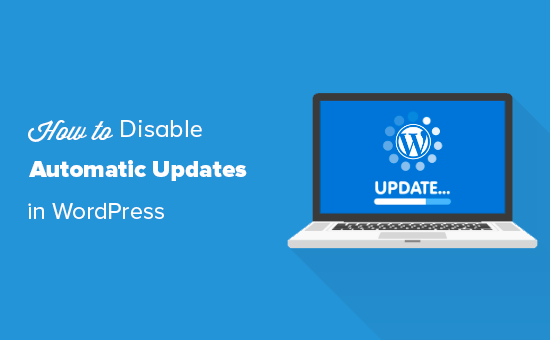
WordPress Neden Otomatik Olarak Güncellenir
WordPress, güvenlik nedenleriyle çekirdek WordPress yazılımını otomatik olarak günceller.
Bazen, potansiyel bir tehdidi düzeltmek için bir eklentiyi veya temayı da güncelleyebilir. Örneğin, bir WordPress eklentisi veya teması kritik bir güvenlik açığını gidermek için güncellenebilir. Eğer bu eklenti veya tema birçok web sitesi tarafından kullanılıyorsa, WordPress çekirdek ekibi bunun için otomatik bir güncelleme yayınlayabilir.
Bu durumlar dışında, WordPress güncellemeleri ne zaman yüklemek istediğinize karar vermenize olanak tanır.
Otomatik WordPress güncellemelerini kapatmanızı önermiyoruz. Önemli bir güvenlik özelliğidirler.
Ancak, bazı nadir durumlarda güncellemeler web sitenizi bozabilir veya işlevselliğini etkileyebilir. Bu, işinizi ve müşterilerinizi kaybetmenize neden olabilir.
Manuel güncellemeleri kendiniz yönetebileceğinizden eminseniz, WordPress'te otomatik güncellemeleri güvenle devre dışı bırakabilirsiniz.
WordPress otomatik güncellemelerini devre dışı bırakmak için size iki kolay yöntem göstereceğiz: biri kod kullanarak, diğeri ise bir eklenti kullanarak, böylece sizin için en iyi çalışan yaklaşımı seçebilirsiniz. Tercih ettiğiniz yönteme doğrudan atlamak için aşağıdaki hızlı bağlantıları kullanmanız yeterlidir:
- Yöntem 1. WordPress Otomatik Güncellemelerini Kod Kullanarak Devre Dışı Bırakma (Önerilen)
- Yöntem 2. Bir Eklenti ile Otomatik WordPress Güncellemelerini Yapılandırma ve Devre Dışı Bırakma
- WordPress Otomatik Güncellemelerinin Artıları ve Eksileri
- Should I Disable Automatic WordPress Updates?
Yöntem 1. WordPress Otomatik Güncellemelerini Kod Kullanarak Devre Dışı Bırakma (Önerilen)
Tema veya çekirdek dosyalarınıza dokunmadan otomatik WordPress güncellemelerini devre dışı bırakmanın en basit ve en güvenli yolunu istiyorsanız, ücretsiz WPCode eklentisi en iyi seçeneğinizdir.
Genellikle, otomatik güncellemeleri kod kullanarak devre dışı bırakmak için, dikkatli olmazsanız ikisi de riskli olabilecek temanızın functions.php dosyasını ve wp-config.php dosyasını düzenlemeniz gerekir.
Ancak WPCode, WordPress kontrol panelinizden doğrudan kod parçacıkları eklemenize olanak tanır, bu nedenle herhangi bir dosyayı manuel olarak düzenlemenize gerek kalmaz. Bu, sitenizi yanlışlıkla bozma riskini azaltır.

Ayrıca, otomatik WordPress güncellemelerini devre dışı bırakma, REST API'yi devre dışı bırakma, SVG dosya yüklemelerine izin verme, yorumları devre dışı bırakma ve daha fazlası gibi popüler kod parçacıkları bulabileceğiniz yerleşik bir kod kitaplığı ile birlikte gelir. Bu, çok sayıda tek kullanımlık eklenti yükleme ihtiyacını ortadan kaldırır.
Not: Ücretsiz WPCode eklentisi, WordPress'e özel kod eklemek için ihtiyacınız olan her şeye sahiptir. Özel bir bulut kod parçacığı kitaplığı, dönüşüm pikselleri, zamanlanmış kod parçacıkları, kod revizyonları ve daha fazlası gibi gelişmiş özellikler istiyorsanız, WPCode Pro'ya yükseltebilirsiniz.
Başlamak için ücretsiz WPCode eklentisini yüklemeniz ve etkinleştirmeniz gerekir. Yardıma ihtiyacınız olursa, bir WordPress eklentisinin nasıl kurulacağına dair rehberimize bakın.
Eklenti etkinleştirildikten sonra, WordPress yönetici kontrol panelinizden Kod Parçacıkları » Kitaplık'a gidin.
Ardından, 'Otomatik Güncellemeleri Devre Dışı Bırak' kod parçasını arayın ve 'Kod parçasını kullan' düğmesine tıklayın.
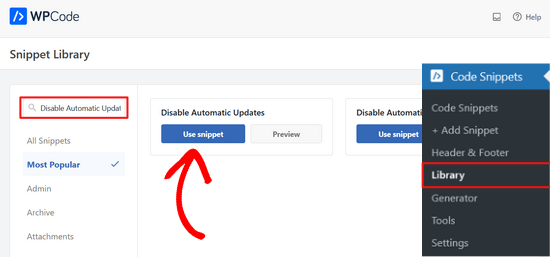
WPCode, kod parçasını otomatik olarak ekleyecek ve uygun ekleme yöntemini seçecektir.
Kod parçacığı, WordPress çekirdek güncellemelerini, eklenti güncellemelerini ve tema güncellemelerini devre dışı bırakmak için üç filtreye sahiptir.
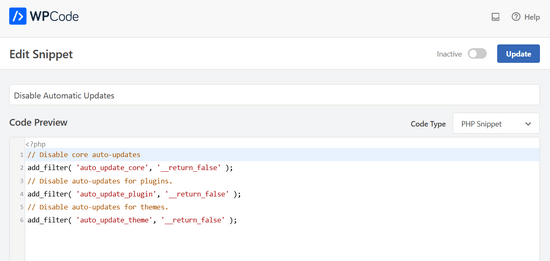
Bu filtrelerden birini kullanmak istemiyorsanız, filtre satırının başına // ekleyerek kodu düzenlemeniz yeterlidir.
Örneğin, çekirdek otomatik güncelleme filtre satırına // eklemek, çalışmasını engelleyecektir. Böylece, çekirdek için otomatik güncellemeler alacaksınız, ancak eklentiler ve temalar için almayacaksınız.
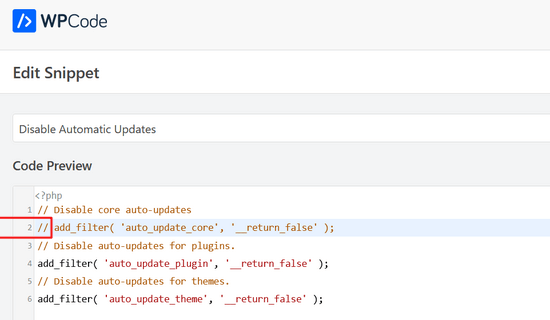
Bundan sonra yapmanız gereken tek şey anahtarı 'Etkin Değil'den 'Etkin'e getirmektir.
Ardından, 'Güncelle' düğmesine tıklayın.

İşte bu kadar. Artık WordPress'te otomatik güncellemeleri devre dışı bıraktınız.
Alternatif: WordPress dosyalarıyla çalışmaktan rahatsanız, wp-config.php dosyanıza şu kod satırını ekleyerek otomatik güncellemeleri devre dışı bırakabilirsiniz:
define( 'WP_AUTO_UPDATE_CORE', false );
Bu, tüm otomatik WordPress güncellemelerini devre dışı bırakacaktır.
Önemli: WordPress’te wp-config.php dosyasını güvenli bir şekilde nasıl düzenleyeceğinizle ilgili adım adım talimatlar için WordPress'te wp-config.php dosyasını güvenli bir şekilde nasıl düzenleyeceğiniz hakkındaki makalemizi okuduğunuzdan emin olun.
Tema ve eklenti güncellemelerini devre dışı bırakırken yalnızca küçük çekirdek güncellemelerini almak istiyorsanız, tema functions.php dosyasına aşağıdaki filtreleri ekleyerek bunu yapabilirsiniz:
Otomatik WordPress eklenti güncellemelerini devre dışı bırak:
add_filter( 'auto_update_plugin', '__return_false' );
Otomatik WordPress tema güncellemelerini devre dışı bırak:
add_filter( 'auto_update_theme', '__return_false' );
Yöntem 2. Bir Eklenti ile Otomatik WordPress Güncellemelerini Yapılandırma ve Devre Dışı Bırakma
Otomatik WordPress güncellemelerini devre dışı bırakmanın bir diğer yolu, Easy Updates Manager eklentisini yükleyip etkinleştirmektir. Bunu nasıl yapacağınızdan emin değilseniz, WordPress eklentisi nasıl kurulur hakkındaki adım adım kılavuzumuza göz atın.
Eklenti etkinleştirildikten sonra, ayarlarınızı yapılandırmak için Gösterge Tablosu » Güncelleme Seçenekleri'ne gidin.
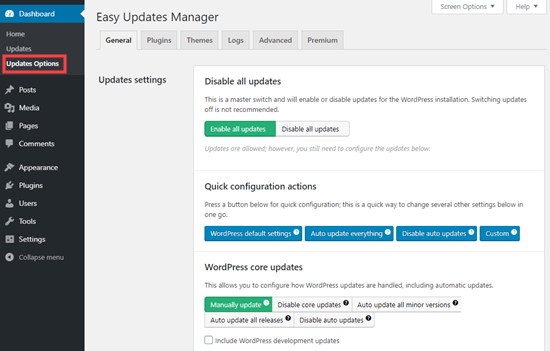
'Tüm güncellemeleri devre dışı bırak' seçeneğini seçebilirsiniz, ancak bu seçeneği önermiyoruz. Öncelikle, tüm güncelleme bildirimlerinin görünmesini engelleyecektir.
Bunun yerine, istediğiniz ayarları seçmelisiniz. Eklenti ve tema otomatik güncellemelerini devre dışı bırakabilir, ancak standart çekirdek WordPress otomatik güncellemelerini etkin bırakabilirsiniz.
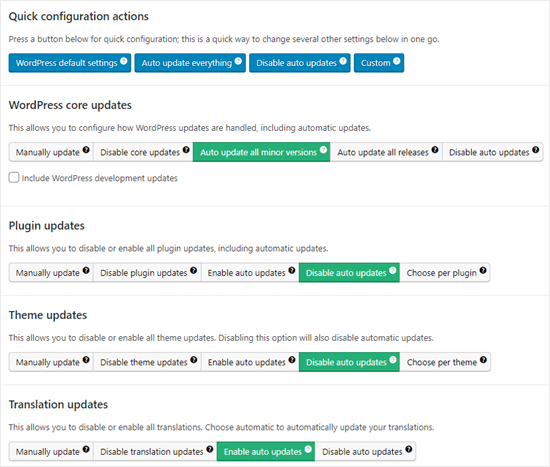
Not: ‘Eklenti güncellemelerini devre dışı bırak’ ve ‘Tema güncellemelerini devre dışı bırak’ seçeneklerini ‘Otomatik güncellemeleri devre dışı bırak’ yerine seçerseniz, eklenti ve tema listelerinizde güncelleme bildirimlerini hiç görmezsiniz.
Easy Updates Manager, nelerin güncellendiğinin bir kaydını tutar, bu nedenle sitenizde herhangi bir sorun olursa, önceki çalışan bir sürüme geri dönebilirsiniz. Bunu görüntülemek için Kontrol Paneli » Güncelleme Seçenekleri'ne gidin ve ardından 'Günlükler' sekmesine tıklayın.
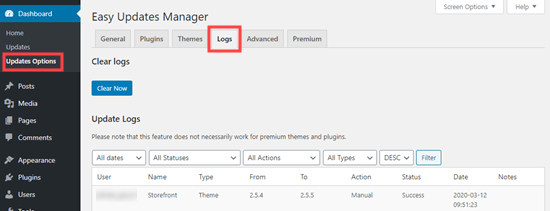
Easy Updates Manager'ın ayrıca, birçok ek seçenek sunan premium bir sürümü de bulunmaktadır.
Örneğin, en popüler WordPress yedekleme eklentilerinden biri olan UpdraftPlus ile entegre olur, böylece güncellemeler uygulanmadan önce sitenizin otomatik bir yedeğini çalıştırabilirsiniz.
WordPress Otomatik Güncellemelerinin Artıları ve Eksileri
Şimdi otomatik güncellemeleri nasıl devre dışı bırakacağınızı biliyorsunuz, ancak bunları devre dışı bırakmalı mısınız? Doğru cevap yok ve bu size ve web sitenize bağlı.
Sitemizde, eklenti ve tema otomatik güncellemelerini devre dışı bıraktık, ancak küçük çekirdek güncellemelerini etkin tuttuk.
Otomatik güncellemelerin avantajlarına ve dezavantajlarına bir göz atalım. Bu şekilde, sitenizde otomatik güncellemeleri devre dışı bırakıp bırakmayacağınıza karar verebilirsiniz.
WordPress'te Otomatik Güncellemelerin Avantajları
Otomatik güncellemeler WordPress güvenliği için harikadır. Birçok kullanıcı eklentilerini veya çekirdek WordPress kurulumlarını güncellemeyi unutur.
WordPress otomatik güncellemeleri etkinleştirildiğinde, WordPress'in küçük bir güncellemesi yayınlandığında sitenizi güncelleme konusunda endişelenmenize gerek kalmaz. Bunlar bakım ve güvenlik amacıyla yayınlanır.
Geçmişte, otomatik güncellemeler yalnızca yönetilen WordPress barındırma satın alarak elde edebildiğiniz bir şeydi. Şimdi, herkes için kullanılabilir (en azından küçük sürümler için).
Ayrıca, WordPress veya popüler bir eklentiyle ilgili kritik bir güvenlik sorunu varsa, WordPress'in otomatik olarak güncelleneceğini de biliyorsunuz. Meşgul olsanız veya evde olmasanız bile siteniz güvende kalacaktır.
Çok sayıda siteniz varsa, otomatik güncellemeler size oldukça zaman kazandırabilir. Tek bir siteniz olsa bile, WordPress'in işleri hallettiğini bilmenin verdiği iç huzuru tercih edebilirsiniz.
WordPress'te Otomatik Güncellemelerin Dezavantajları
Güncellemeleri yayınlamaktan sorumlu çekirdek WordPress ekibi, sorunsuz bir şekilde ilerlemesini sağlar.
Ancak, otomatik güncellemelerin sitenizi bozma ihtimali az da olsa vardır. Tecrübelerimize göre, küçük sürümler henüz sitelerimizden hiçbirini bozmadı.
Bunun nedeni, en iyi uygulamaları takip etmemiz ve herhangi bir çekirdek dosyayı değiştirmememizdir. WordPress çekirdek dosyalarını değiştirirseniz, bu otomatik güncellemeler onları geçersiz kılabilir.
WordPress, kullanmakta olduğunuz bir tema için bir güvenlik güncellemesi yayınlamayı gerekli görürse, web sitenizin bozulma ihtimali vardır. Bu, özellikle tema dosyalarınızı değiştirdiyseniz geçerlidir.
Otomatik eklenti güncellemeleri de sitenizi potansiyel olarak bozabilir. Farklı sunucu ortamları ve eklenti kombinasyonları gibi çok fazla değişken var.
Şimdi, bu güncellemelerin web sitelerinin büyük çoğunluğunu bozmayacağını bilmek önemlidir. Yine de, riski almak istemediğinizi hissedebilirsiniz.
Bir diğer dezavantajı ise, siteniz güncellendiğinde her zaman otomatik olarak bir bildirim alamayacak olmanızdır.
Otomatik WordPress Güncellemelerini Devre Dışı Bırakmalı mıyım?
Temelde, bu kararı vermek size kalmış.
Çoğu yeni başlayan ve WordPress web sitelerinin büyük çoğunluğu için otomatik güncellemeler zararsızdır ve bunları devre dışı bırakmamalısın.
Ancak, eğer bir online mağaza işletiyorsanız veya bozuk bir site nedeniyle iş kaybetmek istemiyorsanız, otomatik güncellemeleri güvenle kapatabilirsiniz.
Yine de, web sitenizin güvenliğini sağlamak için bu güncellemeleri zamanında manuel olarak yüklediğinizden emin olun.
Video Eğitim
İzleyerek daha iyi öğreniyorsan, WordPress'te otomatik güncellemelerin nasıl devre dışı bırakılacağına dair video eğitimimize göz at:
WordPress Güncellemeleriyle İlgili Ek Kaynaklar
Umarım bu makale WordPress'te otomatik güncellemeleri nasıl devre dışı bırakacağınızı öğrenmenize yardımcı olmuştur. Şimdi, WordPress güncellemeleriyle ilgili diğer rehberlerimize göz atmak isteyebilirsiniz:
- WordPress'in En Son Sürümünü Kontrol Etme ve Güncelleme
- WordPress Web Sitesi Hemen Güncellenmezse Nasıl Düzeltilir
- WordPress Eklentilerini Doğru Bir Şekilde Nasıl Güncellersiniz (Adım Adım)
- WordPress'te Eklenti Güncellemeleri Nasıl Devre Dışı Bırakılır ve Neden Yapmamalısınız
- WordPress'te Büyük Sürümler İçin Otomatik Güncellemeler Nasıl Etkinleştirilir
Otomatik veya manuel güncellemeleri kullanıyor olun, sitenizin düzenli yedeklerinin olduğundan emin olmanız çok önemlidir. Ayrıca, WordPress sitenizin yedeğini nasıl alacağınıza dair rehberimize göz atmak veya en iyi WordPress güvenlik eklentileri karşılaştırmamızı görmek isteyebilirsiniz.
Bu makaleyi beğendiyseniz, lütfen WordPress video eğitimleri için YouTube Kanalımıza abone olun. Bizi ayrıca Twitter ve Facebook'ta da bulabilirsiniz.





Stefano
Resmi WordPress sitesindeki gibi:
Yalnızca:
define( ‘AUTOMATIC_UPDATER_DISABLED’, true );
tüm otomatik güncellemeleri devre dışı bırakacaktır.
define( ‘WP_AUTO_UPDATE_CORE’, false );
tanımda belirtildiği gibi yalnızca wp çekirdek otomatik güncellemelerini devre dışı bırakacaktır.
Renato Frota
wp-config.php üzerinde “add_filter” kullanma önerisi acemice ve sorunlara yol açma eğilimindedir – ayrıca wp-cli'nin (wp-cli.org) WordPress kurulumunuzla çalışmasını da bozar.
Bunun yerine şunu kullanın:
define( ‘AUTOMATIC_UPDATER_DISABLED’, true );
Ve her zaman “İşte bu kadar, düzenlemeyi durdur!” diyen satırdan ÖNCE koyun.
WPBeginner Desteği
Merhaba Renato,
add_filter yönteminin, kodun functions.php dosyasına veya siteye özel bir eklentiye gitmesi gerektiğini açıkça belirttiğini muhtemelen fark etmediniz.
Yönetici
George Applebee
Web sitemi yedeklemenin beni büyük bir WP yükseltmesinden koruyacağına dair konsepte kapılmamla ilgili korku hikayem.
Sitemi büyük bir yükseltmeyle manuel olarak yükselttikten sonra site bozuldu, bu yüzden en sevdiğim *ss yedekleme yazılımım Updraft plus'a gittim, ancak WP yükseltmesinin veritabanı yapısını ve dosya adlarını değiştirdiğini gördüm. Veritabanı üzerine yazılamadığı için yedekleme değersizdi.
Ah! Eski bir WP sürümünü bulmak ve sıfırdan yeni bir veritabanı ve WP kurulumuyla başlamak zorunda kaldım. Ardından eklentiyi yükleyerek müşterimin web sitesini geri almak için yedekleme yazılımımı kullanabildim. Dikkatli olun, WP yükseltmeleri veritabanı yapısını tamamen değiştirebilir!
pabster
Aylar boyunca 'WP_AUTO_UPDATE_CORE' ayarını false yaparak otomatik güncellemeleri tamamen devre dışı bırakmama rağmen, WP kendi kendine otomatik olarak güncellenmiş!! 3.9 sürümündeydim ve şimdi aniden 4.2.2 sürümüne geçmişim. Bu nasıl mümkün olabilir? Bu kişiler benim gibi insanlara otomatik güncelleme zorlamak için hala gizli, saklı bir koz mu saklıyorlar?
WPBeginner Desteği
Bazen web barındırıcılar sunucularındaki güncel olmayan yazılımları otomatik olarak günceller. Barındırma sağlayıcınızla iletişime geçin.
Yönetici
pabster
Onlarla iletişime geçtim. Güncellemediler.
Eoin
Web sitem de, bunu önlemek için kodda kod parçacığı olmasına rağmen otomatik olarak güncellendi. Hosting şirketi de bunu yapmadı. Herhangi bir fikriniz var mı?
Una
Otomatik WordPress güncellemelerinden nefret ediyorum. Sonuncusu temamı bozdu.
Bu yüzden bunu devre dışı bırakma yolu için çok teşekkür ederim.
J Man
Bu oldukça çılgınca fikri ilk başta kim akıl etti acaba…
pabster
It’s a totally commercial thing. Nothing really much to do with “security” and that kind of mantra. We’re in a capitalistic world, and everything is ruled by money. Even “free” software is.
nathi
Otomatik güncelleme benim için olmazsa olmaz, çok sayıda özelleştirme yapıldı ve güncellemeye devam etmeden önce yeni Wordpress sürümlerine karşı ölçülmesi gerekiyor - kesinlikle bu Kodu kullanacağım. Teşekkürler
Gadi
Otomatik güncelleme şablon sürümüyle herhangi bir çakışmaya neden olabilir mi?
grisales
Elbette olabilir!
Bir tema indirdiğinizde, hangi WP Sürümüyle uyumlu olduğunu kontrol etmelisiniz.
Güncelleme çıktığında, siz veya bu uzantıların yazarları tarafından uyumlu olduğu test edilmediği sürece, eklentileriniz ve özelleştirmeleriniz yeni sürüme uyumlu hale gelene kadar çekirdeği güncellememeniz gerektiğini her zaman aklınızda bulundurun.
Jan Fikar
Bana kalırsa, bir şeyin kontrolsüz veya herhangi bir şekilde güncellenmesinden (yeniden yazılmasından) nefret ediyorum. Tüm web sayfasını yok edebilecek uyumsuz bir eklenti olabilir.
Patrick Mercer
Az önce otomatik bir güncelleme yaşadım ve işe yaramasına rağmen, bu ipucunu buldum ve otomatik güncellemeleri olabildiğince hızlı bir şekilde kapattım. Bir şeyin aniden farklı çalışmaya başlamasını ve nedenini anlamak için zaman harcamam gerektiğini sevmiyorum. Hayatımı sizin hızınızda değil, kendi hızımda yaşıyorum.
ElDerecho
Otomatik güncellemeler, web uygulamaları için olağanüstü kötü bir fikirdir. Güncellemeyi bozarlarsa (MS'in Windows güncellemeleriyle defalarca yaptığı gibi), işletmelerin güvendiği milyonlarca genel siteyi potansiyel olarak mahvederler. Ya da daha kötüsü, sistem istismar edilirse, hackerlara, spamcılara ve kim bilir daha kimlere milyonlarca sunucuya erişim vermiş olurlar.
Web sunucusu tarafından çalıştırılabilir dosyalara (bu durumda PHP) yazma izni vermek başlı başına tehlikelidir.
Her neyse, gönderi için teşekkürler.
Agarwalls
Çok yardımcı oldu, teşekkürler.
gabriel
Teşekkürler, bu gerçekten baş ağrıtıcıydı
RobS
Bunun kötü bir politika olduğunu düşünüyorum ve Genel Ayarlar'da bir açma/kapama seçeneği oluşturmaları gerektiğini düşünüyorum. Zamanında güncellemek istiyorum, ancak en son WP yükseltmesiyle çalışmayan birçok eklenti durumuyla karşılaştım. Genellikle eklenti geliştiricisinin eklentilerini düzeltmesini beklemek zorunda kalıyorum.
WP, dağıtımdan önce tüm eklentilerin yeni güncellemelerle çalışacak şekilde yükseltileceğini garanti edebilseydi, o zaman evet, mantıklı olurdu. Ancak açık kaynak dünyasında bu asla olmayacak.
Rachel Ramey
Ne kadar değerli olduğu konusunda, sitelerimin hepsi büyük bir sürüme otomatik olarak güncellendi. (3.7x'ten 3.8x'e ve 3.8x'ten 3.9x'e)
Nicole Kavanagh
WordPress Otomatik Güncellemelerine tamamen katılıyorum.
Bir işletme sahibi ve wordpress eklentileri satan biri olarak, iş modelimiz tam zamanında geldi.
Geliştiricilerin ömür boyu Güncelleme ve Destek ile eklenti satabildiği günler geride kaldı, herhangi bir işletme ödenmeyen bir hizmeti nasıl sunar? Bu, hiçbir işletme için uygulanabilir veya sürdürülebilir değildir.
WordPress ve e-ticaret uzantılarını daha yeni sürümlerle uyumlu tutmanın bakımı, herhangi bir ekip için çok talepkardır.
Bu, bakımı yapılmayan eklentiler satan geliştiriciler için gerçekten yeni bir boyut katacaktır. Genellikle daha ucuz eklentilerde, sonunda bu geliştiricilerin ürünlerini satmaya devam etmeyeceğini görebilirsiniz.
Ürünlerimizin tamamını 1 yıl Güncelleme ve Destek dahil olmak üzere **$ maliyetle satmaya başladık, sonraki her yıl için yeni bir Lisans anahtarı gereklidir: Aktivasyon, Güncellemeler ve Destek almaya devam etmek için indirimli bir fiyattan.
Wordpress otomatik güncellemeleri bizim için mantıklı, bu bizim işimiz ve tüm eklentilerimizi sürdürmek bizim yaptığımız şey.
Çok zaman ve test gerektiriyor, ardından tabii ki ürün bilgileri, ürün açıklamaları, ürün ekran görüntüleri, ürün belgeleri de güncellenmeli.
Wordpress'lerini, e-ticaret eklentilerini hiç güncellememiş bazı müşteriler olabilir ve sonunda bir şeyler bozulur.
Ancak, bir Güncelleme bildirimi olduğu anda eklentilerini güncelleyen müşteriler de var.
Tüm geliştiriciler kodlarını yeni sürümlere uyacak şekilde koruma konusunda aynı gemideyse, bu adil bir oyun alanı, katılıyorum.
Nicole, Extension Works'ten.
Mac Gyver
Nicole, o kadar yanılıyorsun ki nereden başlayacağımı bilmiyorum.
Öncelikle, Yoast'ın güncelleme ayarlarımı değiştirmesine izin vermedim ve ÇOK sinirliyim.
İkinci olarak, kural ASLA WEB SİTESİ YEDEKLEMESİ YAPMADAN GÜNCELLEME YAPMAMAKTIR. Web siteleri otomatik güncelleme yaptığında bu güvenlik özelliği engellenir.
Üçüncüsü, WP güncellemelerinin hantal otomatik yüklenmesi, WordPress olmayan sitelerimden birini internetten düşürdü – Google diyor ki:
“Bu web sitesinin sahibi sizseniz, web sitenizi yüklememişsiniz (veya yanlış yüklemişsiniz). FTP istemci yazılımı veya web tasarım yazılımı kullanarak web sitenizi yükleme hakkında bilgi için, FTP Yükleme Bilgileri için buraya tıklayın.”
Bu benim en eski web sitem, WordPress değil ve Yoast'ın iznim olmadan yüklediği “güncelleme hilesi” bunu ve daha fazlasını yaptı. Etkilenen web sitesinde herhangi bir yapılandırma değişikliği yapmadım; ana alanın bir alt alanına yapılan otomatik WP güncellemeleri bunu yaptı.
Şimdi sunucularımı düzeltmeleri için GoDaddy teknisyenlerine ayırdığım zamanı boşa harcamam gerekiyor.
Bana inanın, bu görevi bitirdiğimde Yoast'ın sosyal medyadaki dikkatini çekeceğim.
Düzenleme: Yoast'ın kötü tasarlanmış "hack"i nedeniyle 6 web sitemden biri değil, İKİ tanesi çevrimdışı oldu. Yakından dinlerseniz cızırtımı duyabilirsiniz.
Orangorangan
Kod parçacığı için teşekkürler! Web sitemin başkası tarafından güncellendiğini sanmıştım, beni çok korkuttu! haha
Mohsin Alam
Sadece tema güncellemesini devre dışı bırakmak istiyorum, tam çekirdek güncellemesini değil. Bunu nasıl yapabilirim? Teşekkürler
WPBeginner Desteği
Mohsin, daha iyi bir strateji, bir alt tema oluşturmak ve tüm değişikliklerinizi alt temada yapmaktır. Ancak tema güncellemenizi durdurmanız gerekiyorsa, bunu style.css dosyasındaki tema başlığını düzenleyerek yapabilirsiniz.
Yönetici
anon
Ha! Müşterinin siteyi güncellediğini sanmıştım, bu yüzden FTP'yi devre dışı bıraktım, ancak bunun Wordpress'in varsayılanı olduğunu öğrendim. LOL!
Bir geliştirici olarak geçirdiğim bunca zaman boyunca bu kadar aptalca bir fikir duyduğumu hiç sanmıyorum! Bu nasıl onaylandı – bu aptalca fikir hakkında çevrimiçi bir başlık tartışılıyor mu?
CoolStory
O zaman muhtemelen bir müşterinin web sitesini oluşturmak için blog yazılımı kullanmayı bırakmalısınız
Dan
WordPress'in yalnızca bloglar için kullanılabileceğini düşünüyorsanız, dikkat etmiyorsunuz demektir.
Christina
Dün bir web sitem otomatik olarak 3.8.2'ye güncellendi ve bu sabah işe gittiğimde sitenin ana sayfası bozuktu.
Genesis framework ve bir alt tema kullanıyorum, bu yüzden çekirdeği düzenlemedim. Site yayına girmeye neredeyse hazırdı ve şimdi genesis'in bana bunu düzeltmeme yardımcı olabileceğini umabilirim.
Yedeklemem var ama bunun zahmetine girmek istemiyorum, özellikle de birkaç gün önce alındığı için.
Kesinlikle otomatik güncellemeleri kapatacağım ve bunların berbat bir fikir olduğunu düşünüyorum. Güncellemeden hemen önce yedek almadan bir şeye güvenmek için eklentiler ve tema çakışmaları arasında çok fazla değişken var. :O(
Javier
Tamam, ama ya bir hacker güncelleme için wordpress sunucusunun kontrolünü ele geçirirse ve sonra kötü amaçlı bir güncelleme iterse?? Dünyadaki web sitelerinin yarısı çöker, şimdiye kadarki en büyük DoS veya her sunucu kötü amaçlı yazılımla enfekte olur. ÇILDIRIYORUM!!
WPBeginner Desteği
Hiçbir otomatik güncelleme oldukça güvenli değildir.
Yönetici
Joanna Benson
Otomatik güncellemeler kötü bir fikir. Eklenti uyumluluk sorunları ne olacak?! WordPress güncellenmeden ÖNCE kullandığım ana eklentilerin WordPress'in en son sürümüyle uyumlu olduğundan emin olmak istiyorum. Bir eklentinin uyumlu olmadığı için sitemi bozduğunu sonradan öğrenmek, ihtiyacım olmayan bir baş ağrısı. WordPress'in otomatik güncellemeleri uygulamadan önce bunu düşünmemiş olması oldukça şaşırtıcı!
Christian
Katılıyorum! Örneğin Qtranslate, en son wp sürüm numarası koda yazıldığı için baş belasıdır...
Mark
Mutlak suretle ihtiyaç duymadığım sürece eklenti yükleme konusunda çok temkinliyim.
Ayrıca, çakışan eklentiler hakkında tema geliştiricisiyle her zaman görüşürüm… Bazı kötü deneyimlerim oldu.
Destek ve güncellemeler nedeniyle yalnızca premium eklentiler kullanmanızı öneririm
Nicole
Otomatik güncellemeleri devre dışı bırakırdım çünkü bazen Wordpress güncellemeleri, işlevselliği bozduğu veya sitedeki düzeni altüst ettiği için çok zaman alıyor. Bu, yeni Wordpress sürümüyle çalışmayan bir tema kullandığımda veya sitem Yii Framework (PHP MVC mimarisi) ile entegre olduğunda olur. Canlı site otomatik olarak güncellenmek yerine, güncellemeyi bir test sitesinde deneyebilmem daha iyi olur.
Devre dışı bırakma bilgisi için teşekkürler!
Todd Nagel
Bunun için teşekkürler, oldukça fazla wordpress sitesini yönetiyorum, herkesin her zaman olmak istediği yerde olmak için bütçesi yok, sitelerin hepsinde 'en iyi' kod yok, bazıları çok eski bu yüzden eski eklentiler kullanıyorlar, bir güncellemede birçok şey ters gidebilir..
Wordpress'in bunu 'uyarı' olmadan eklemesi bence gerçekten yanlış.
ve geçen günkü 3.8'e manuel güncellemem, iletişim formu 7 için 'e-posta onaylama' eklentisi güncel olmadığı için bir web sitesini bozdu..
Birkaç güncelleme içinde kaldığınız sürece oldukça güvende olacaksınız ve biz her zaman önce bir 'dev' klasöründe yaparız..
T
Mel Brady
Son güncelleme iyi çalışan ürünümü mahvetti. Onarmak birkaç gün sürdü. Bu tüm wordpress güncellemelerinde olacak mı. Sitemi düzeltmekten daha çok işim var.
Sharon J
Otomatik güncellemeleri sevmiyorum çünkü hatalar olması durumunda beklemeyi tercih ederim. Ayrıca, bir sorun olursa 80-100 müşterim var. O sitelerin TÜMÜNDE bir sorun olursa ne olur? Kesinlikle kendi sitemde ve gelecekteki sitelerimde otomatik güncellemeleri devre dışı bırakacağım.
Jocelyn Wing
Sana katılıyorum Sharon. Olmayı bekleyen bir felaket. Bu yüzden buradayım çünkü bir müşterim fark etti ve web sitesinin görünümünün neden sürekli değiştiğinden şikayet etti.
Yazılımı daha güvenli hale getirdiği için WordPress topluluğuna teşekkürler.
Buradaki tavsiye için teşekkürler.
Arend
Bu tür insanların yeterince olduğunu düşünüyorum, teknik olmayan bilgisayar kullanıcısını aptal sanan.
Wordpress geliştiricilerinin saf kibirinin artık uğraşmak istemediğim bir şey olduğunu düşünüyorum.
Bu yüzden 6 yıllık mutlu kullanımdan sonra Wordpress'e veda ediyorum....
ve benim kararlarımı vermeye çalışan geliştiricileri olmayan yeni bir CMS sistemi arayışındayım.
Eni
Katılıyorum.
İnternet'te oldukça tuhaf bir şeyler oluyor. G, FB, WP... hosting şirketleri..., "güvenlik" yazılımları...., açık kaynaklı tarayıcılar ve İnternet'i kullanmamız gereken diğer yazılımlar... sanki herkes hayatımızı daha "kolay" ve "daha güvenli" hale getirmek için birbirini itiyor, otomatik güncellemeler ve bizim adımıza çalışan diğer "hizmetler"le dolu bir şekilde, ne olup bittiği ve ne yapıldığı konusunda bizim tarafımızdan çok az veya hiç kontrolümüz olmadan.
Böyle bir otomasyon, insanların yıllarca süren çabalarının sonuçlarını bir saniyede yok edebilir,
bu etkinin sorumlusu kimse olmadan.
Çünkü işler karmaşık ve senkronize değil, çoğu durumda sorunların nereden kaynaklandığını bulmak için aylar, hatta yıllar harcamanız gerekir. Sanırım hiçbirimiz böyle bir durumla başa çıkamaz. WP kullanan herkes bilir ki, temel ihtiyaçlarınıza göre çalışması için en az 10-20 eklentiye ihtiyacınız var. Ve sadece eklentiler ve WP güncellemeleriyle başa çıkmak, hiçbiri birbiriyle senkronize olmayan, size çok fazla zaman, sinir ve enerjiye mal oluyor. Sanki sadece bunu yapmakla meşgul olmalıyız.
Hiç mantıklı değil.
İyi değil.
JOhnne
Elbette mantıklı, otomatik tarayıcı güncellemeleri tamamen gereklidir, aksi takdirde eski css desteğiyle eski ie 6/7'de takılıp kalırdık. Kızgın olabilirsiniz, ancak tüm geliştiriciler tarayıcı güncellemeleri için minnettardır, microsoft'un uzun zaman önce yapması gereken yol buydu ve şu ana kadar bu saçmalık ie 6 / 7 / 8 sürümleri çalışıyor olmazdı. Bunun yüzünden bugün web yaratıcılığında ve inovasyonunda büyük bir gecikme yaşıyoruz ve bu senaryodan yavaş yavaş çıkıyoruz!
Umm Hayır
Bugün 3.8.1 ile bir siteyi çökerttim, bunun olacağını hiç bilmiyordum. Diğer tüm sitelerde kapattım. Bir daha böyle bir şey olmasına izin vermeyeceğim. Cuma günü güncelleyin ki hafta sonumu ortalığı temizleyerek geçirebileyim. ve sonra bozuk siteler hakkındaki tüm konuları wp desteğinde sileceğim. Sanki insanların sitelerini bozduklarını ve sizin temizlemeniz için bıraktığınızı bilmelerini istemiyorlar gibi.
Barbara
Benim iki kuruşum: Otomatik güncellemeler her zaman en uygunsuz zamanda bana denk geliyor gibi. Bu, onları kapatmak için yeterli bir sebep. Makale için teşekkürler!
Glen
2007'den beri bir WordPress kullanıcısıyım ve daha sonra WP kullanarak 3 web sitesi daha ekledim. WP'nin yeni sürümleri çıktığında sitelerimi her zaman kendim güncelledim. 2007'de güncellemeler hakkında bilgi edinirken, yeni bir WP sürümüne güncellemeden önce tüm eklentilerin devre dışı bırakılması gerektiğine dair özel ve önemli talimatlar verildiğini hatırlıyorum. Bu yüzden hep böyle yaptım. Şimdi, küçük sürümler için otomatik güncellemeyle sitelerim otomatik olarak güncelleniyor. Bu, eklentileri devre dışı bıraktıkları anlamına mı geliyor? Değilse, eklentilerin artık devre dışı bırakılmasına gerek kalmaması için ne değişti? Bu konuda biraz gerginim.
WPBeginner Desteği
Glen, bunun için endişelenmene gerek yok. Güncelleme sırasında WordPress sitenizi bakım moduna alır, bu da eklentileri devre dışı bırakmak gibidir. Ardından sitenizi günceller ve bakım modunu kapatır.
Yönetici
Glen
Çok teşekkürler destek ekibi. Muhtemelen bunu bilmeliydim. Bu konuda beni kesinlikle rahatlattınız. Önceki endişelerim ortadan kalktı. Tekrar teşekkür ederim.
kodu nereye eklemeliyim?
Nereye ekleyeceğinizi hangi dosyaya ekleyeceğinizi söylüyorsunuz. O dosyaya nereye ekliyoruz? Yapılandırma dosyamda bozmak istemediğim çok şey var. Kodu o dosyaya nereye yapıştırmalıyım? Lütfen daha fazla bilgiye ihtiyacım var.
Brian
Güncellemeler en son yapıldığında tamamen bozulan iki web sitem var. http://pizzaspotz.com ve http://gotinterviews.com adreslerinde çekirdek dosyaları değiştirdim. Çocuk temalar oluşturma konusunda çok deneyimsizim. Bunu yapamıyorum. Bana cahil deyin. Ama bir gün çocuk temalar oluşturursam, bu iki sitede otomatik güncellemeleri etkinleştirebileceğimi ve otomatik güncellemelerin artık siteleri bozmayacağını merak ediyorum.
WPBeginner Desteği
Brian evet, çocuk temalarının önerilmesinin nedeni budur.
Yönetici
Brian Humek
Bu güncellemeleri nasıl devre dışı bırakacağımı tekrar kontrol etmek için sitenizi bugün tekrar ziyaret etmek zorunda kaldım. WP'nin sitelerimden bazılarını güncellediğini gördüm ve sanırım bu günlerde çok şey unutuyorum. Tekrar kontrol ettim ve son güncellemede sorun yaşayan iki sitemin gerçekten devre dışı bırakıldığını buldum.
Yine de, kolay öğreticiniz için tebrikler.
Nathan
Bu kod satırını yapılandırma dosyama eklemek çoklu site kurulumlarına yardımcı olur mu? Çalıştırmadan önce açıklama / doğrulama yapmam gerekiyor.
WPBeginner Desteği
Evet
Yönetici
Paul G.
Merhaba millet,
Siteniz için WordPress Otomatik Güncellemelerinin çoğunu tamamen özelleştirmenize olanak tanıyan eklentimize yaptığımız bir eklemeyi bildirmek istedim.
WordPress Simple Firewall'un ( http://wordpress.org/plugins/wp-simple-firewall/ ) “Otomatik Güncellemeler” bölümünde bulacaksınız.
Hope you like!
Paul.
Barbarella diğer adıyla Çılgın Kedi Kadın
Otomatik güncellemeleri kapatma seçeneği olmadan "zorlanmaktan" memnun değilim. Bunu wp-config.php'ye nasıl koyacağımı bilsem de, başkalarının hiçbir fikri olmayabilir ve en azından gösterge tablosunda otomatik güncellemeleri devre dışı bırakma seçeneğimizin olabileceği bir açma/kapama düğmesi verilmesi gerektiğini düşünüyorum.
Yine de bu kod parçacığı için teşekkürler. Şimdi tüm sitelerimde uygulayacağım (ve ÇOK sayıda WP sitem var!).
Rachel Ramey
Kesinlikle katılıyorum. WordPress'in kendi kullanıcı belgeleri, güncellemeden ÖNCE HER ZAMAN YEDEK ALINMASINI belirtiyor ve şimdi sitelerimiz iznimiz olmadan kendiliğinden güncellendiği için bu seçeneğimiz yok. Ve kapatmak için kodu hacklemeniz gerekiyor. Bu gülünç ve tamamen APTALCA!
Bunu varsayılan hale getireceklerse, sana katılıyorum – ayarlarda bir “kapatma” düğmesi veya onay kutusu olmalı.
Patty Ayers
Syed, burada sağladığınız kodun Andrew Nacin tarafından şu gönderide şiddetle tavsiye edilmediğini merak ediyorum: http://make.wordpress.org/core/2013/10/25/the-definitive-guide-to-disabling-auto-updates-in-wordpress-3-7/
“AUTOMATIC_UPDATER_DISABLED sabiti, otomatik güncelleyiciyi tamamen devre dışı bırakmak için kullanılabilir. DISALLOW_FILE_MODS gibi — hiçbir değişiklik yapılmasına izin verilmez — ancak bu, otomatik güncelleyiciye özeldir.
Yalnızca çekirdek güncellemeleri engellemek için bunu kullanmayın! Diğer birçok işlevi de engellemiş olursunuz. Çekirdek, temalar ve eklentiler için çeviri güncellemeleri (dil paketleri) alamazsınız. Yeni WordPress sürümlerinden sizi haberdar etmek için e-posta yoluyla gönderilen güncelleme bildirimlerini alamazsınız. Ayrıca ince ayarlı kontrol olanağını da devre dışı bırakır.
Yoksa ben mi (muhtemelen) bir şeyi yanlış anlıyorum?
WPBeginner Desteği
Bunu belirttiğin için teşekkürler Patty. Makaleyi güncelledik.
Yönetici
Erni
“true” ile olan kodun doğru olduğundan emin misiniz, yoksa bu bir hata mı ve güncellemeleri devre dışı bırakmak için koda “false” eklemeniz mi gerekiyor?
Kendim için WordPress'i arka plan güncellemeleri olmadan tek başıma güncellemek istiyorum. Otomatik güncellemeleri devre dışı bırakmaya kendiniz karar verme seçeneğiniz varsa harika olur.
WPBeginner Desteği
Bu makalede yapmaya çalıştığımız şey budur.
Yönetici
Erni
Thank you. Sorry my fault I read something different.
Jenny
Bu ipucu için teşekkürler, bir sürümü üretimde kullanmadan önce yüklü eklentilerle uyumluluğunu test etmeyi her zaman tercih ederim
adolf witzeling
Bu hızlı ipucunu paylaştığınız için teşekkür ederim. WP 3.7'yi yeni kurdum ve en son sürümü çalıştırmak istesem de, güncellemeler konusunda kontrol bende olsun istiyorum - bir şeyin benim haberim olmadan değişmesi beni tedirgin ediyor, çünkü bir değişiklik yaptıktan sonra bir şeyler ters giderse en azından nerede sorun gidermeye başlayacağım konusunda iyi bir fikrim olur. Yakın zamanda bir eklenti güncellemesi kurdum (eklentilerimi otomatik olarak güncellemesi gerekiyordu) ve geriye sadece boş bir ekran kaldı!! Geri getirip çalışır hale getirmem (lanet olası bir acemi olarak) biraz zaman aldı. Sorun eklentiler değildi, güncelleyiciydi, çünkü kurulu sürümlerden bazılarını [yani 2.3.1 ve üçüncü rakamı - (.1) görmezden gelerek] görmezden geldi. Bir daha o boktan bir şey yaşamak istemiyorum.
Cam
@ Henk – Çoğunlukla sana katılıyorum, ancak otomatik güncellemelerin istenmeyebileceği durumlar vardır. Kendi durumumda kendi kontrol ve denge sistemim olduğu için bir süre önce otomatik güncellemeleri devre dışı bıraktım. Güncellemeler ve sitelerinin bakımı konusunda dikkatli olan kullanıcılar için, otomatik güncellemelerin çoğu kullanıcı için olacağından daha az önemli olduğunu düşünüyorum.
Elizabeth
I was horrified after upgrading to 3.7 to see the notice that updates would be automatic. Thank you for posting this fix. I’m still struggling with learning how to use the theme functions file so still have a number of changes to the core files. I know it’s ill-advised but all the changes I’ve made are cosmetic….
Christopher Simmons
Also worth noting, on some installs the permissions may not allow for WP to do *any* updates if the system was installed through an RPM via something like Plesk/Parallels where the folders are “owned” by Apache; these sometimes need to be manually upgraded as any update will fail and possibly break both core and plugins (if WP tries to update plugins also).
Christopher Simmons
Ah. Güncelleme: özel izinlere/güvenliğe sahip sitelerde, WP akıllıca bu bildirimi 3.7 yükseltmesinden sonra gösterecektir:
Bu site bu güncellemeleri otomatik olarak uygulayamıyor. Ancak yeni bir güvenlik sürümü çıktığında [adminemail] adresine e-posta göndereceğiz.
Viktoria Michaelis
Otomatik güncellemeleri devre dışı bırakmak veya etkinleştirmek için bir kontrol paneli bağlantısı, kod satırını güncellemek zorunda kalmaktan çok daha iyi bir çözüm olurdu.
Russell Cohen
Evet, bu çok daha mantıklı bir çözüm gibi görünüyor!
ultimatrompeta
Bu konuda haklısın. Beni hayal et, 20 web sitesinin yapılandırma dosyasını düzenlemem gerekiyor!
Keith Davis
Selam Millet
Bana yükseltmeden önce tüm eklentileri devre dışı bırakmam ve yükseltmeden sonra yeniden etkinleştirmem öğretildi – insanlar artık bunu yapmıyor mu?
Devre dışı bırakılabileceğini bilmek güzel ve nasıl yapılacağını gösterdiğin için teşekkürler.
Curt
On yıllardır (paranoyak) bir sistem yöneticisiyim ve öğrendiğim bir şey (Micro$oft bana çok iyi öğretti) ASLA, ASLA, HİÇBİR KOŞULDA, ASLA otomatik güncelleme etkinleştirmemektir!
Birinin "geliştirme" fikrinin bağımlı olduğunuz bir şeyi ölümcül şekilde bozmadığından emin olmak için önce bir sanal alan test ortamında çalıştırın.
Şimdilik bu satırı ekleyeceğim, ama yukarıdaki Ann-Marie ile AYNI FİKİRDEYİM.
Şu anda bir eklenti otomatik güncelleme devre dışı bırakma yaması ve mümkünse çekirdekte yapılandırılabilir bir seçenek ASAP.
Curt
Ve, bu güncellemenin .htaccess'teki bir fonksiyona bağlı bir özelliği, yedekleme yapmadan ince ayarlı yapılandırmamı tamamen değiştirerek BOZDUĞUNU yeni keşfettim.
İyi ki bunu uzun zaman önce öğrenmişim ve kendi yedeklerimi İSTEDİĞİM gibi alıyorum.
ann-marie
Otomatik güncellemeleri durduracak bir eklenti bulacağımı umuyorum.
Bu kod satırını ekleme konusunda kendime güvenmiyorum.
12 tane wordpress.org sitem var.
Himanshu G
Aynen!
Bazen wordpress çekirdek dosyalarında değişiklik yapmamız gerekiyor ve bu değişiklikleri kaldırabilecekleri için otomatik güncellemeler istemiyoruz…
I was also interested in knowing that will this feature gonna automatically update plugins and themes also or just the wordpress install (as if we do not makes changes in WordPress than let it be updated automatically…)
suneel
harika bilgi…
Teşekkürler
Angelika
Harikasın! Harika yazıların için teşekkürler! Bu çok takdir ediliyor.
Henk
Otomatik güncellemeleri DEVRE DIŞI BIRAKMAYIN. Bir nedeni var!!
Sitenizin bir güncelleme nedeniyle bozulma ihtimalinin hafif olması, hacklenme ciddi ihtimalinden 1000 kat daha iyidir.
Gümüş
Henk, bu duruma bağlı. Bu WP projesi iş açısından kritik olduğunda, bu otomatik güncellemenin siteyi şaşırtıcı bir şekilde çökertmesi kötü bir durumdur.
Bu tür projelere dikkat edilmesi gerekir ve bunlar manuel olarak güncellenebilir ve hatalar oluştuğunda gerekli düzeltmeleri hemen yapabilirsiniz...
Ancak bu kişisel bir blog veya benzeri bir şey olduğunda bu iyidir
Kevin Edwards
@Henk,
"Sitenizin bir güncelleme nedeniyle bozulma ihtimalinin küçük olması, hacklenme ihtimalinin ciddi olmasından bin kat daha iyidir"
For some of us it’s not a slight possibility, but rather a 100% guarantee that an update is going to break the site. I manage several sites that break on updates due to WordPress changing the way it handles enclosures and a necessity to edit functions.php after each update to avoid enclosures from being auto-deleted from my posts.
Otomatik güncellemeyi devre dışı bırakarak, herhangi bir rastgele zamanda sitelerimin bozulacağı endişesi olmadan, zamanında güncelleyebilirim.
Katie
@Kevin – we’re having a problem with the enclosure update, too. What did you add to your functions file to keep these from being auto deleted? Thank you
Eni
Bunu da bilmek isterim.
Ayrıca
#1
tema ve tüm eklentiler için otomatik güncellemeleri önlemek üzere wp-config.php dosyasına ek kodlar eklememiz gerekiyor mu?
…………….
Şunu kastediyorum:
“…Önceki yapılandırma seçenekleri hepsi ya da hiçbiri şeklindedir. Ancak, daha ayrıntılı bir şeye ihtiyacınız olabilir. auto_update_$type filtresi (auto_update_core, auto_update_plugin, auto_update_theme, auto_update_translation) belirli güncellemeler için tetiklenir…”
http://make.wordpress.org/core/2013/10/25/the-definitive-guide-to-disabling-auto-updates-in-wordpress-3-7/
…………………..
Satır ekleyebilir miyim:
define( ‘WP_AUTO_UPDATE_THEME’, false );
define( ‘WP_AUTO_UPDATE_PLUGIN’, false );
tema ve eklenti otomatik güncellemelerini devre dışı bırakmak için ???
#2
Bir alt tema oluşturdum, bu yüzden bu kodları alt temamın dosyalarına (functions.php ???) dahil edebilir miyim
ve böylece her WordPress güncellemesinde tekrar baştan yazmak zorunda kalmadan üzerine yazılmazlar??
Herhangi bir girdi çok takdir edilecektir, teşekkürler
Andy
Elbette, sadece bir blog veya ortalama bir WordPress kullanıcısı gibi bir şey çalıştırıyorsanız, otomatik yükseltmelere sahip olmak mantıklıdır çünkü WordPress, insanların sitelerinde çalıştırdığı büyük miktarda eski kod nedeniyle güvenli değildir.
Ancak, otomatik güncellemeler, düzenli bakım yapan bir geliştirici ekibinin bulunduğu büyük işletmelerden kurumsal şirketlere kadar kesinlikle kabul edilemez. Her şeyin sürüm kontrollü ve test edilmiş olması gerekir.
I work most often with Drupal and one of the great things they do is separate security updates from other updates, so there is less chance of breaking your site but also a higher level of security. WordPress on the other hand just lumps in security updates with regular updates.